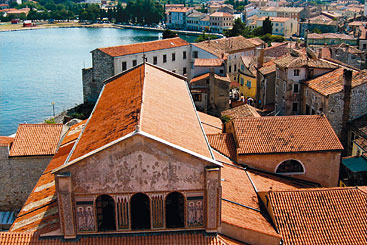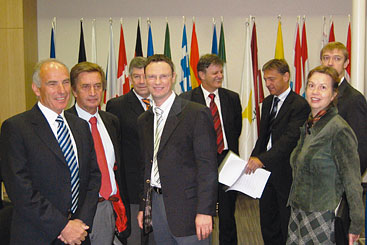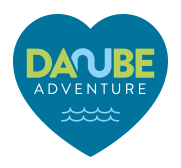German-Croatian twinning project launches
ICPDR Danube Watch

German-Croatian twinning project launches
The new project, ‘Implementation of Water Framework Directive in Croatia’ builds close partnerships to provide technical and administrative knowledge to implement European water protection policies.

Poreč, located on the coastline of Istria, is one of the most popular tourist destinations because of its beauty and historical values.
Known as the country of the thousand islands, Croatia attracts tourists from all over Europe. Named the top destination for 2005 by travel guide publisher Llonely Planet, Croatia’s beautiful beaches, ancient cities and ports have created unprecedented tourist travel to the country in the last five years. There were 53 million overnight stays in 2006 – an increase of almost 40% within the last six years.
With most tourists visiting in the summer, seasonal changes are significant in Croatia. Poreˇc, located on the coastline of Istria, is one of these popular destinations. While 200,000 m3 of wastewater are treated in winter, 550,000 m3 must be treated during the summer season. In addition to the challenges for water supply and wastewater treatment, almost half of the country consists of karstic areas, most of them in coastal zones. A two-year Twinning Project on environmental issues in Croatia will address these problems and ensure sustainable management of resources for the benefit of both residents and tourists alike.
“With the help of the Twinning Project, the Croatian WDF implementation approach will be in line with other Danubian upstream countries,” says Zdravko Krmek, Croatian state secretary. “Croatia will be well prepared for the upcoming challenges, including its reporting obligations to Brussels.”
Managing resources in Croatia. Croatia is located between the Danube River Basin in the north and the Adriatic Sea in the south. From a total surface of 87,609 km2, 56,538 km² are land areas and 31,071 km² cover coastal areas. While the Sava and Drava basins are located in the Danube catchment area, the Dalmatian and Istrian basins empty into the Adriatic Sea. Many watercourses in Croatia have transboundary significance, and transnational cooperation plays an important role in water resource management.
As a candidate country for EU accession since 2005, Croatia is obliged to integrate new requirements of the EU water acquis. While other EU member states have had time to familiarise themselves with the EU Water Framework Directive (WFD), Croatia, as an accession country, has not had this privilege and has to face a particularly challenging timeframe. “It is not a coincidence that the first Croatian Twinning Project in the environmental sector deals with this Directive,” said Fritz Holzwarth, German Water Director, at the kick-off meeting for the project.

The kick-off for the project was held in September 2007 and brought together (from left to right): Albert Göttle, President of the Bavarian State Office for Environment; Sigfried Heise, Twinning Advisor, Bavarian Ministry for Environment, Public Health and Consumer Protection; Fritz Holzwarth, German Water Director, German Ministry of Environment, Nature Conservation and Nuclear Safety; Stephan von Keitz, RTA, Twinning project ‘Capacity Building and Development of Guidelines for the Implementation of Water Framework Directive’; Zdravko Krmek, State Secretary at Ministry of Regional Development, Forestry and Water Management; Vincent Degert, Head of EU Delegation to Croatia; Oskar Benedikt, ECD, Head of Section – Social Cohesion, Regional Development and Infrastructure; and Martina Karbowski, Project Leader, German Environmental Ministry.
Working together to implement changes. The two-year project, ‘Implementation of the EU Water Framework Directive in Croatia’, began in September 2007 with Germany as senior twinning partner and the Netherlands as junior partner. The project covers all aspects of WFD implementation in order to prepare the country’s reporting obligations and to ensure a nation-wide approach.
The main beneficiaries of the project are the newly established Croatian Ministry of Regional Development, Forestry and Water Management and the main water management authority Croatian Waters (Hrvatske vode). “The cooperation is very fruitful,” says Zdravko Krmek, Croatian State Secretary. “With the help of the Twinning Project, the Croatian WFD implementation approach will be in line with other Danubian upstream countries. Therefore, Croatia will be well prepared for the upcoming challenges, including its reporting obligations to Brussels.”
And because the water on the Adriatic coast is crystal clear, the number of tourists might further increase.
For more information, please visit: www.wfd-croatia.eu.
IMPLEMENTATION OF WDF IN CROATIA –
TWINNING PROJECT
The objectives of the project are based on the following principles:
- Capacity building enhances the Croatian water administration in organising the process of WFD implementation.
- Integrated approach aims to identify links within different regions as well as with other policies, such as maritime, agriculture, and land use planning, to name only a few.
- Holistic approach views the water system including groundwater, surface waters and coastal waters, in a co-ordinated way to enhance synergies and avoid duplication.
- Ecology supports the administration in applying assessment systems to define the ‘good ecological status’, a true indicator of the health of the ecosystem and its biodiversity.
- Economic principles seek to promote the efficient use of water through proper pricing policies.
- Transparency views public participation as one of its central features.






